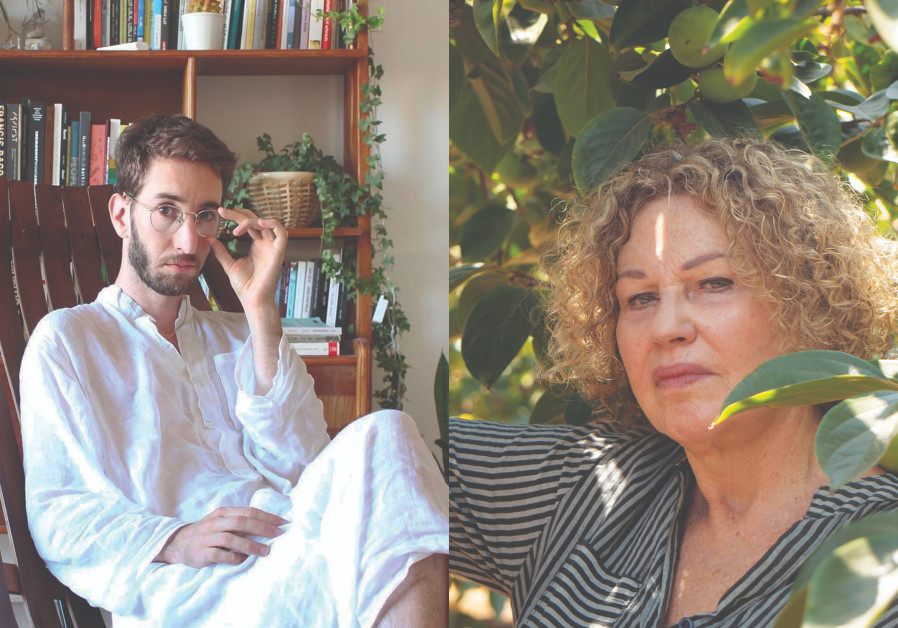The heavy glass door at the entrance to the Feldman Building, a newly renovated and sleek-looking structure that is home to the Israel Institute for Advanced Studies, bears a trace of small and thick white letters. A sentence pasted at the bottom of the entryway, located separately from the proud masthead, is almost unnoticeable. Standing at the threshold, I carefully read it over, lingering a minute longer before I step into one of the most important facilities of Jerusalem’s Hebrew University:
“And always when the birds return to the tree I look for the one flying backwards.”

THE PECULIAR placement of Mishol’s words, subtly greeting visitors to the institution, is a part characteristic of the artistic whole she is now displaying in a joint exhibition with visual artist Yoav Weinfeld. Together, the two creators have left marks and signs of their separate creative processes, tucked in unlikely locations throughout the building. Weinfeld’s paintings, alongside excerpts from poems Mishol has written, are intermingled and juxtaposed in their duo exhibition, curated by Michal Mor and playfully entitled: “For the Brain Is a Lump of Poison.”
More confident and mature than ever in her writing, Mishol left quotes in nooks and crannies of the building from the introspective poems she wrote, hidden in odd spots, such as between the couches of the lounge. Some of the texts, which are bound together in a modest booklet, are more personal in nature, yet consciously aware of themselves and delivered like a sharp gaffe, such as the brief and unpunctuated “Morning”: “I woke up fuzzy / I hadn’t developed right / I should have been glossy, brilliant / But I came out matte.”
Other texts by Mishol, like “Pardon” (which appears only in a Hebrew version in the brochure of the show), are contemplative pieces in which she airs out her thoughts about her journey as a writer: “I beg the pardon of the poems that are still hospitalized in the yellow folder of prematures… I beg pardon for the ease with which I pressed the DELETE button and the rage with which I tore, ripped, and buried without a tombstone all the words in the mass grave of the paper bin.”
His works, small in scale, pale in palette and crafted with acrylic and industrial paint over wooden surfaces, depict enigmatic faces veiled by masks and disintegrating bodies that could also be interpreted as amorphous and disassembled contraptions, floating in space. Hanging from heavy machines or positioned mid-canvas with no support, the faces Weinfeld paints appear to collapse into themselves, reminiscent of the evasive quality Mishol ascribes to inspiration in her self-scrutinizing passages. His stylistic decision to let the paint ooze and drip almost uncontrollably renders his characters into protracted visages on the cusp of collapse, half-humans half-apparatuses that are here but almost gone.
Mishol agrees that despite the fact that they work in different artistic mediums, she and Weinfeld share a creative dialect.
“From the very creation process to our work environment and the materials we choose to deal with, we have a lot in common,” she tells The Jerusalem Post in a recent interview. “When I was offered to do a joint exhibition with a visual artist, I immediately thought about Yoav. It felt very right to invite a young artist to work with me, because I was curious about the fact that we grapple with the same themes through different languages of art, despite our age difference.”
WEINFELD SHARES that the two began their collaboration previously, when Mishol invited him to design the cover of her latest book.
“I was very moved by Agi’s invitation,” he says. “She told me that she had been offered to work with various senior artists, but she decided that she wanted to work with me. It’s always moving when people put their trust in you. We connect in our notions of what creation is, and our connection was effortless.”
The two also share a humorous if conscious approach to art-making, Weinfeld adds, which allowed them to poke fun at themselves and to create light-heartedly amidst academic scholars working in a serious environment.
“Agi and I are both artists, and we made it a point to call the exhibition ‘For the Brain Is a Lump of Poison’ after a verse from one of Agi’s poems. Part of our approach and motivation was to offer a different perspective that would contrast the academic seriousness. We wanted to be a little spiteful, to mess things up a bit. For example, I’m presenting a painting of a man sitting and thinking, which is a bit of a joke about the iconic image we all know of the modernist man sitting, thinking and writing.”
Asked whether they encountered challenges in the attempt to merge their different aesthetics and modes of creation, Mishol shares that they tried to “avoid turning this into illustrative work. I didn’t want to write something in response to Yoav’s paintings, or for Yoav to paint in reaction to my poems.”
Weinfeld remarks that my experience of the installation as a maze-like array was intentional and meant to further dissuade viewers from experiencing the paintings as didactic interpretations of the poems, or vice versa.
“The installation invites visitors to meander through the space. As they go along, they discover more paintings and more lines from Agi’s poems. The idea is that you should be walking through the building with the booklet of poems in hand and looking at the paintings, without being entirely sure which work connects to which poem.”
Pondering Weinfeld’s paintings of masks, Mishol comments that his works “correspond with the experience we all had over the past year. It also relates to the idea that all of us, when we write, paint or talk, can express many different selves. Do we shed our masks when we communicate, or do we keep them on?”
